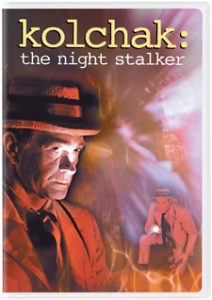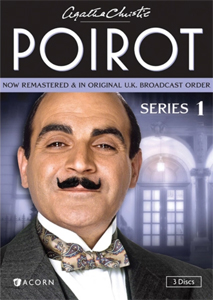It took 13 years after Agatha Christie’s death until we got the definitive version of Hercule Poirot on screen, with David Suchet starring in the 10 episodes of “Agatha Christie’s Poirot” Season 1 in 1989 on Britain’s ITV. Although actors had played Poirot as far back as 1928 on stage (Charles Laughton) and 1931 on screen (Austin Trevor), the Christie estate was generally cautious about letting Poirot stories be adapted.
The definitive Poirot
That changed with Suchet’s turn, although no one knew in 1989 that the series would end up adapting nearly every Poirot short story and novel, running until 2013. As with American shows, British shows need ratings to stay on the air, and “Poirot” was not considered a sure hit out of the gate.
Suchet obviously studied Christie’s works, capturing the Belgian sleuth’s myopia and ability to hone his little grey cells. He filters out what people verbally tell him and instead follows the raw clues. Suchet is the definitive Poirot not only in appearance – egg-shaped head and flawless mustache – but also in behavior.

“Agatha Christie’s Poirot” Season 1 (1989)
ITV, 10 episodes
Lead writer: Clive Exton
Starring: David Suchet, Hugh Fraser, Pauline Moran
That said, I’m glad I read Christie’s work first, because no matter how faithful, an adaptation alters a reader’s perception. Christie’s Poirot has an edge; he can treat people meanly – including his best friend and foil Hastings (Hugh Fraser on the show), who believes everything he hears. Sure, we accept it as “Poirot being Poirot” on the page, but Suchet does play a nicer, cuddlier version of the character.
Creating a formula
Warming up the premise and crafting a series-long structure, primary writer Clive Exton makes Hastings into Poirot’s roommate at Whitehaven Mansions. Poirot works from behind a desk out of the flat, and since Hastings is often present, he accompanies Poirot on the cases. He’s not officially identified as Poirot’s assistant (and it’s unclear if he’s on the payroll), but he serves that purpose.
Much expanded from the books are the third and fourth leads. Miss Lemon (Pauline Moran) — who only appeared in eight Christie works — is pretty (although I’m not a huge fan of her 1930s spit-curls) and decidedly OCD, making her the perfect secretary. She also takes up butler duties handled by the books’ George/Georges. And Inspector Japp (Philip Jackson) is the by-the-book detective (standing in for the story’s official sleuth, if it isn’t already Japp himself), amusingly bemused by Poirot.
While the theme song and opening titles scream “1930s by way of the 1980s,” “Poirot” holds up well three decades later. Not merely a faithful adaptation of Christie’s works, it’s also influential in its own right. Suchet’s portrayal of Poirot’s exactitude likely inspired Tony Shalhoub’s “Monk” (2002-09), the entire run of which happened within “Poirot’s” run.
Here are my rankings of the 10 episodes of Season 1, with the episode number and writer in parentheses, plus notes on where the episode can be found in the (unfortunately non-chronological) DVD sets and in which U.S. collection the source material can be found. (SPOILERS FOLLOW.)

1. “Murder in the Mews” (2, Exton)
My favorite novella from the strong collection of the same name is nicely adapted. Juliette Mole gives a low-key sinister turn as Jane Plenderleith, and I love the villain’s clever plot: making a suicide look like a murder staged as a suicide.
In a surprising but not unwelcome difference from the books, Poirot plays a hole of golf and enjoys it. In Christie’s “Murder on the Links,” he finds golf lacks order and method. This episode marks the first reference to it being 1935; unlike the decades-spanning stories, the TV series will mostly be contained to a few years’ time.
DVD: Set 10
Story: “Murder in the Mews”
2. “Triangle at Rhodes” (6, Stephen Wakelam)
Although Season 1 isn’t lavish, money is spent on this Greece-filmed installment. This is the first episode without Hastings, Lemon and Japp, but Suchet carries it ably. A strong supporting cast helps, including helper Pamela (perky Frances Low) and murder victim Valentine Chantry (Annie Lambert). She’s so despicable that everyone becomes a suspect simply by having encountered her at the vacation spot.
“Papa Poirot” (to borrow a book term) knows about human behavior amid love triangles (a trait introduced one episode prior in “The Third Floor Flat”). His suspicion of Marjorie Gold (whom he warns to leave the island before tragedy strikes) isn’t quite earned by Angela Down’s performance. Still, this is a neat trial version of the lovelorn revenge theme made famous in “Death on the Nile.”
DVD: Set 11
Story: “Murder in the Mews”
3. “The Adventure of the Clapham Cook” (1, Exton)
The debut episode has deliberate pacing and staging a la the 1930s but also leaves things to implication, including why Mrs. Todd – who had hired Poirot — suddenly wants Poirot off the case. (She has been paid off, off screen.) Christie often wrote humorously ridiculous side characters, and it’s a blast to see kitchen helper Annie (Katy Murphy), for whom Poirot dumbs down his interview technique.
Along with the expansion of Poirot’s colleagues’ roles, another TV-ization is that more drama is added to the capture of the bad guy – via action and the music score. Here, the culprit puts up a struggle as the cops grab him; admittedly, this is tame compared to foot and car chases of later episodes.
Although this is not Poirot’s first case, it is the first one we see. So it’s neat that “Clapham Cook” ends with Poirot framing Mrs. Todd’s check for one guinea and placing it on his wall (or rather, instructing Miss Lemon do so). It’s an appropriate symbol for the small beginning of something big.
DVD: Set 9
Story: “The Under Dog and Other Stories”
4. “The Dream” (10, Exton)
I like the plot and how Poirot sees through it: A guy poses as an already murdered (in a nearby room) business magnate. He calls in Poirot, supposedly to investigate, but really to use him as an alibi. (Talk about overplaying one’s hand!) When villains use prosthetics in books, we let our imaginations make the disguise flawless, but it’s hard to pull off on screen. Here, the villain uses harsh lighting so Poirot doesn’t get a clear view, so that sells it. Also featuring a humorous subplot wherein Miss Lemon desires a new typewriter, this is a fun hour founded upon a clever plot.
DVD: Set 12
Story: “The Regatta Mystery and Other Stories”
5. “The Third Floor Flat” (5, Michael Baker)
This episode is homey – a murder at Whitehaven Mansions itself! – yet refreshing. We meet four 20-somethings who stumble upon a corpse by mistakenly entering the wrong flat through a coal lift when locked out of their own. The “Poirot”-verse need not be old and stodgy. One downside: Baker doesn’t emphasize Christie’s humor about Poirot’s pleasure at being recognized. His fame seems understated in the TV series. In the short story he actually rents his unit under an assumed name so as to limit visitors, but he runs more of a traditional P.I. practice in the TV show.
DVD: Set 11
Story: “The Mousetrap and Other Stories”
6. “Problem at Sea” (7, Exton)
If this seems like a continuation of Poirot’s vacation in “Triangle at Rhodes,” well, it is. The production shot two episodes in Greece for efficiency. Hastings joins up as we meet a ship full of suspects who all dislike another of those thoroughly despicable eventual victims. We see the first chronological instance of the Poirot cliché made famous by “Murder on the Orient Express”: a stagey reveal of the killer, wherein he calls everyone into a room (including the killer!) and explains what happened.
DVD: Set 11
Story: “The Regatta Mystery and Other Stories”
7. “King of Clubs” (9, Baker)
Core Christie staples are dramatized, including Hastings’ tendency to believe the words of a pretty woman (Niamh Cusack as actress Valerie Saintclair), and a tendency for criminals to vaguely blame murders on “a tramp.” Humorously, Japp actually does investigate a camp of gypsies near the murder site.
Although Poirot does not approve of murder – as he states in “Problem at Sea” — this episode weirdly reveals that he is OK with assault. Poirot deduces the deceased was killed in an attack gone too far (he hits his head on the furniture and dies), but he does not share this with police. I’m unclear if Poirot doesn’t trust Japp to properly charge the assailant, or if he is making an extrajudicial moral judgment.
DVD: Set 12
Story: “The Under Dog and Other Stories”
8. “The Incredible Theft” (8, David Reid and Exton)
The introductory sequence essentially gives away the revelation and a long car chase through wooded roads closes the hour. This is an example of narrative add-ons (to fill out the runtime) detracting from what was originally a mysterious plot. A lot of “Theft” consists of waiting for Poirot to reveal what we already know. But it does feature good examples of those 1930s hats that Christie found ridiculous – the kind that are fashionably attached to the side of a woman’s head, rather than serving a function.
DVD: Set 12
Story: “Murder in the Mews”
9. “The Adventure of Johnny Waverly” (3, Exton)
Japp is at his most pathetic here. He brings about a dozen bobbies to the estate where a kidnapping has been threatened, and they let the kid get nabbed right under their noses! The villain is obvious right away but still has to be found out by Poirot. In terms of familiar Christie devices, it’s neat to see a “priest’s hole” (and tunnel) behind a fake bookshelf. And this story mirrors debut Christie novel “The Mysterious Affair at Styles” in that Poirot is a guest at the very house where the mystery unfolds.
DVD: Set 10
Story: “The Mousetrap and Other Stories”
10. “Four and Twenty Blackbirds” (4, Russell Murray)
From the outset, this is obviously an identity-switch case. It’s not so obvious who is switching with who, but it makes for a confusing episode more so than a clever one. We get good Hastings characterization with his flustered behavior around a nude model (Holly De Jong as Dulcie Lang), but it’s not as funny as it could’ve been. And the side humor about Hastings betting on a cricket match is impossible for non-cricket fans to follow. Overall, this is an oddly dreary hour.
DVD: Set 10
Story: “The Mousetrap and Other Stories”
IMDb Top 250 trivia
- “Poirot” ranks No. 159 in the IMDb TV rankings with an 8.6 rating.
- “The Dream” (7.7) is Season 1’s highest-rated episode, while “The Adventure of Johnny Waverly” (6.9) is the lowest.
Sleuthing Sunday reviews an Agatha Christie book or adaptation. Click here to visit our Agatha Christie Zone.

